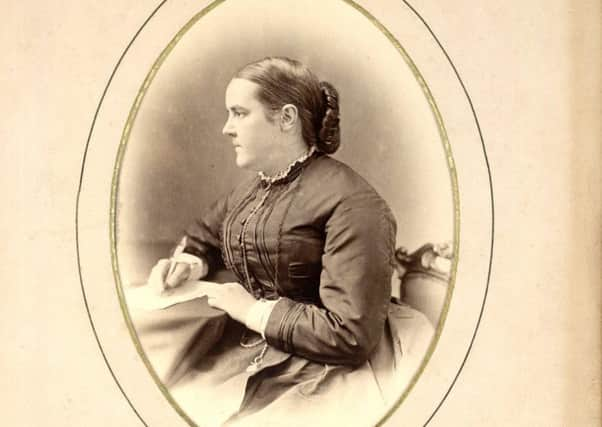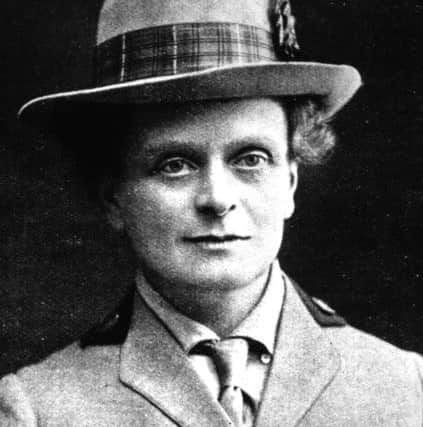Great Scottish women throughout history


Elsie Inglis, doctor and suffragette
Elsie Inglis was a pioneering Scottish doctor and suffragette who founded the Scottish Women’s Hospitals Unit.
After gaining her qualifications from the Royal College of Physicians and Surgeons in Edinburgh, she opened The Hospice in 1894 - a maternity hospital for the poor in Edinburgh. She also became an active suffragist.


Advertisement
Hide AdAfter suggesting women doctors and nurses should be sent to the Western Front during Word War I, Inglis was initially told by the War Office ‘My good lady, go home and sit still’.
Undeterred, she raised thousands and was able to set up the Scottish Women’s Hospitals Unit, providing female-staffed medical units in France, Serbia, Romania, Russia and Corsica.
Inglis worked with her teams of nurses in Serbia and died of cancer in 1917.
She is buried in Dean Cemetery, Edinburgh.
The Edinburgh Seven
The ‘Edinburgh Seven’ was group of pioneering female students in Scotland that became the first in Britain to be admitted onto a university degree programme.
Sophia Jex-Blake, Isabel Thorne, Edith Pechey, Matilda Chaplin, Helen Evans, Mary Anderson and Emily Bovell - matriculated to study medicine at the University of Edinburgh in 1869.
The women’s campaign for the right to train and practice as doctors led to the Surgeons’ Hall riot, where they were verbally abused and pelted with refuse as they attempted to attend an anatomy exam.
Advertisement
Hide AdThe riot, which occurred on November 18, 1870, was a defining moment in the campaign of the Edinburgh Seven and led to increased awareness of the group, and a rise in public sympathy for the women and their fight to study medicine.
Although they were unsuccessful in their struggle to graduate and qualify as doctors, the campaign they fought gained national attention and won them many supporters including famed English naturalist Charles Darwin.
Advertisement
Hide AdIt put the rights to an equal education on the national political agenda and eventually resulted in 1877 legislation that ensured women could study at university.
Flora Macdonald, Jacobite heroine
One of the most romanticised figures in Scottish history, Flora Macdonald is most famous for helping Bonnie Prince Charlie escape from Scotland following the Jacobite’s defeat at the Battle of Culloden in 1746.
Bonnie Prince Charlie had led an uprising to overthrow reigning King George II, and Flora managed to smuggle the ‘Young Pretender’ by boat from the Outer Hebrides -where he was hiding- to the mainland, accompanied by two servants and a crew of six boatmen.
The prince was disguised as Betty Burke, an Irish spinning maid.
When news of the escape broke, Flora was arrested and imprisoned at Dunstaffnage Castle, Oban and then held briefly in the Tower of London. She was released in 1747 and returned to Scotland.
The part that Flora played in the escape of Bonnie Prince Charlie ‘over the sea to Skye’ is immortalised in the ‘Skye Boat Song’, published in 1884:
“Speed bonny boat like a bird on a wing,
Onward the sailors cry.
Carry the lad that’s born to be King,
Over the sea to Skye.”
Victoria Drummond, marine engineer
Advertisement
Hide AdVictoria Drummond was born in Perthshire, in 1894, god-daughter to Queen Victoria.
Shunning her aristocrat background, Victoria became the first British woman marine engineer, and the first female member of the Institute of Marine Engineers.
Advertisement
Hide AdShe was awarded an MBE for bravery at sea during the Second World War when she single handily kept engines of the SS Bonita running while under German bombardment.
Katharine Marjory, first female Scottish MP
Known as ‘the Red Duchess’, in 1923 Katharine Marjory, the Duchess of Atholl, became the first ever female Scottish MP, when she was elected to the House of Commons.
As a Scottish Unionist Party politician, Katharine was a self-proclaimed crusader against international cruelty.
Her open criticism of the Conservative government’s toleration of Spanish dictator Franco cost her position as party whip.
A principled politician, she resigned her parliamentary seat in 1938 in opposition to Neville Chamberlain’s policy of appeasement of Adolf Hitler.
Mairi Chisholm, Scottish nurse and ambulance driver in the First World War
Advertisement
Hide AdMairi Chisholm, from Nairn, joined her friend Elsie Knocker to run a first aid post in Pervyse, a small Belgium village that found itself on the front lines of the First World War.
When war broke out in August 1914, Elsie was 31 and Mairi just 18. One month later, the two were off to Belgium to help with the war effort, leaving behind their families and friends to join a small independent ambulance corps founded by a British doctor, Hector Munro.
Advertisement
Hide AdAs well as their medical work, Mairi and Elsie were a constant presence on the frontline, often handing out hot cocoa and soup to the grateful Belgian soldiers.
They were regularly mentioned in soldiers’ diaries, poems and songs, and were given presents too. Before long, the women were known as the Madonnas or Angels of Pervyse.
In January 1915 Elsie and Mairi were awarded the Order of Leopold II, Knights Cross by King Albert I of Belgium, and in October 1917, the British Military Medal too.